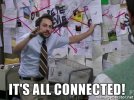Hi guys!
I am implementing GTD "from the bottom up" as suggested by DA and feel that I have a quite good grip on capturing my open loops, having projects, using my waiting for list, using S/M lists, etc.
But I am not so sure about the "higher levels" especially the "areas of focus"
Currently, my areas of focus are:
And I check them but basically do nothing with them on each weekly review (Don't really know what I should do with them)
I get that they should represent important areas of your life, and I feel that mine are, but I am not really sure what to do with the list to give me any value!
So an array of questions:
1) How/why do you use them? (How should you use them?)
2) Do you just use them to check sometimes that might trigger projects?
3) Do you connect your projects to your areas of focus? (I think I've read about people doing that to see how much they work with each area and to see that nothing gets neglected)
4) Do you use sub-areas?
5) How do they differ from the "higher-level goals" (Like for example I have a goal "Become financially independent" and an area called "Economy" since that is important for me, to me that feels quite similar, except that the goal is more concrete) I also have a goal like "get a post in the city council" which also feels more concrete than "Political Party name" as my area of focus is named
Thanks!
I am implementing GTD "from the bottom up" as suggested by DA and feel that I have a quite good grip on capturing my open loops, having projects, using my waiting for list, using S/M lists, etc.
But I am not so sure about the "higher levels" especially the "areas of focus"
Currently, my areas of focus are:
- Work (I work as a software developer and work basically on all the code stack, so I can't really (or at least don't know how to) break it down to more areas as DA suggests in the book)
- Political engagement
- Side hustle
- Economy
- Health
- Friends (added last weekly review)
And I check them but basically do nothing with them on each weekly review (Don't really know what I should do with them)
I get that they should represent important areas of your life, and I feel that mine are, but I am not really sure what to do with the list to give me any value!
So an array of questions:
1) How/why do you use them? (How should you use them?)
2) Do you just use them to check sometimes that might trigger projects?
3) Do you connect your projects to your areas of focus? (I think I've read about people doing that to see how much they work with each area and to see that nothing gets neglected)
4) Do you use sub-areas?
5) How do they differ from the "higher-level goals" (Like for example I have a goal "Become financially independent" and an area called "Economy" since that is important for me, to me that feels quite similar, except that the goal is more concrete) I also have a goal like "get a post in the city council" which also feels more concrete than "Political Party name" as my area of focus is named
Thanks!

